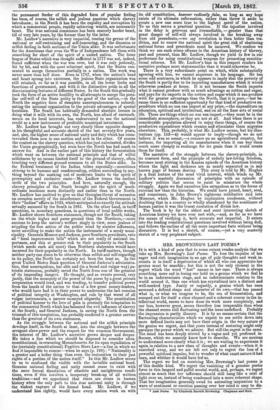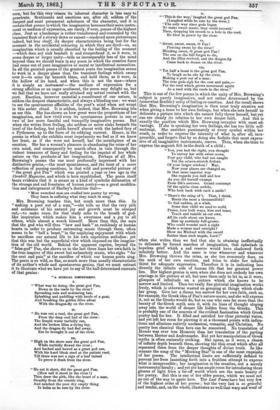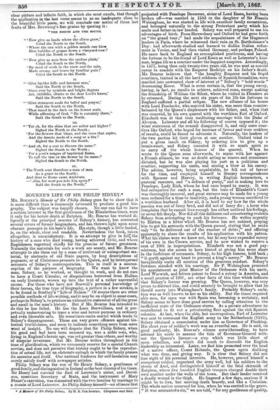MRS. BROWNrNG'S LAST POEMS.*
IT is with a kind of pain that to some extent evades analysis that we take up Mrs. Browning's Last Poems. To lose the impulse of her eager and rich imagination in an age of pale thoughts and weak in- stincts is in itself a deprivation of which all who can appreciate her genius must be sensible ; but this is not the only element in the regret which the word "last" causes in her case. There is always something more sad in losing our hold on a genius which we feel to be in an indeterminate stage, and an indeterminate relation to the world around it, than one which has crystallized into a distinct and well-marked type. Justly or unjustly, a genius which has once assumed a defined shape and character of its own—that has passed what is, or what we imagine to be, the era of fermentation, and scooped out for itself a clear channel and a coherent course in the in- tellectual world, seems to have done its work more completely, and our loss, however great, seems therefore less irreparable than when the channel seems still fluctuating and the issue undefined. Probably the impression is partly illusory. It is by no means certain that the fluctuating characteristics which we expect to see settle down into more defined limits may not have their origin in the very nature of the genius we regret, and that years instead of maturing might only paralyze the power which we admire. But still the regret is the same. The mind has been deeply stirred by a vague and yet profound in- fluence, which we scarcely know how to describe. We are anxious to understand more clearly what it is ; we are waiting to experience it again in relation to a new class of thoughts and events—when it is snatched away, and we are left not only to regret the loss of a powerful spiritual impulse, but to wonder of what exact nature it had been, and whither it would have led us. The regret we feel on receiving Mrs. Browning's last poems is of this double kind. We regret the vanishing of a genuine poetic force in this languid and pallid mental world, and, perhaps, we regret almost as mach that her influence should still hang like a mist of light over us, instead of being condensed into a more coherent shape. That her imagination generally owed its animating inspiration to a wave of sentiment or emotion passing over her mind is easy to dm-
• Last Poems. By Elizabeth Barrett Browning. Chapman and Hall.
cern, but for this very reason its inherent character is less easy to penetrate. Sentiments and emotions are, after all, seldom of the deepest and most permanent substance of the character, and it is certainthat poems inwhich the imagination becomestheir mere instru- ment or medium of expression, are rarely, if ever, poems of-the highest class. Just as a landscape is rather transformed and concealed by the transient flush of a stormy dawn or sunset—rendered more picturesque indeed, but less itself, its deeper characteristics being lost for the moment in the accidental colouring in which they are dyed—so, an imagination which is usually absorbed by the feeling of the moment —which does not sink beneath it and comprehend it, as it were, in some deeper or larger unity—tells us incomparably less of the mind beyond than we should learn in any poem in which the creative force had come out of pure imaginative or moral or intellectual necessities. In all the greatest poems of the greatest poets the imagination seems to work in a deeper plane than the transient feelings which sweep over it—to mine far beneath them, and hold them, as it were, in the hollow of its hand, and when this is not the case—where it is simply an instrument — the medium of expression for a strong affection or an eager sentiment, the poem may delight us, but we feel that we have not really attained any actual contact with the poet. Emotion, however essential a constituent of our nature, is seldom the deepest characteristic, and always a blinding one : we want to see the spontaneous affinities of the poet's mind when not wrapt in this amber cloud. It is seldom, indeed, that Mrs. Browning lets us see this. She has shown us how great were the proportions of her imagination, and how vivid even its spontaneous powers in one or two of her more fanciful and tranquilly imaginative poems. But when she writes from feeling, she seldom or never sinks beneath the level of the feeling, but yields herself almost with the lashed fury of a Pythoness up to the force of its eddying current. Hence, in the poems in which she exhibits most impetuosity we feel as if we knew her least, as if she were not herself, but the mouthpiece of an emotion. She has a woman's pleasure in abandoning the reins of her own mind, and consequently we search often in vain through the richest treasures of fancy and feeling for the imprint of her whole nature on the products of her imagination. Perhaps of all Mrs. Browning's poems the one most profoundly impressed with her distinctive genius,—the most spontaneous, and the least of a mere reflection of passing emotions, is that wild and powerful picture of "the great god Pan" which was printed a year or two ago in the Cornhill Magazine, and which is here republished. The poem itself bears evidence that it is meant as a kind of symbolic delineation of the strange and sad fountains of human poetry—as a great modifica- tion and enlargement of Shelley's doctrine that— "Most wretched men are cradled into poetry by wrong, They learn in suffering what they teach in song."
Mrs. Browning teaches this, but much more than this. In " making a poet out of a man,"—she tells us that the very pith and substance of his natural joy and growth must be scooped oak—to make room for that ready echo to the breath of god- like inspiration which makes him a sweetness and a joy to all others, while almost a wreck himself. More than this, she says that the god who will thus "hew and hack" so recklessly at human hearts in order to produce entrancing music through them, often seems to be "half a beast," in the unpitying enjoyment with which he sacrifices our natural life to his own capricious melodies: yet that this was but the superficial view which imposed on the imagina- tion of the old world. Behind the apparent caprice, beyond the "false god" Pan, she shows us in the last three lines her own faith in the true inspirer of this sweet but melancholy music, who sighs "for the cost and pain" at the sacrifice of which our human poets sing. The poem is so wild, so fine, so much more than usually characteristic of its author's whole and spontaneous genius, that we must extract it to illustrate what we have yet to say of the half-determined currents of that genius :
"A MUSICAL INITICIMSNT.
"What was he doing, the great god Pan, Down in the reeds by the river? Spreading ruin and scattering ban, Splashing and paddling with hoofs of a goat, And breaking the golden lilies afloat With the dragon-fly on the river.
II-
" He tore out a reed, the great god Pan, From the deep cool bed of the river : The limpid water turbidly ran, And the broken lilies a-dying lay, And the dragon-fly had fled away, Ere he brought it out of the river.
an
"High on the shore sate the great god Pan, While turbidly flowed the river ;
And hacked and hewed as a great god .can, With his hard bleak steel at the patient reed, Till there was not a sign of a leaf indeed
To prove it fresh from the river.
rv.
"He cut it short, did the great god Pan, (How tall it stood in the river!) Then drew the pith, like the heart of a man, Steadily from the outside ring, And notched the poor dry empty thing In holes as he sate by the river.
VII.
"Yet half a beast is the great god Pan, To laugh as he sits by the river, Making a poet out of a man: The true gods sigh for the cost and pain,— For the reed which grows nevermore again As a reed with the reeds in the river."
This is one of the few poems in which the unity of Mrs. Browning's subject is purely imaginative, and not rather determined by the (somewhat flexible) unity of feeling or emotion. And the result shows that Mrs. Browning's imagination is then most truly creative not when giving a loose to her own feelings, but when she sets herself to delineate a picture into which she cannot fully throw herself, but yet can see clearly its relation to her own deeper faith. And this is exactly the position which Mrs. Browning occupies with most ad- vantage. If she is speaking her own feelings, she has too little self- restraint. She snatches passionately at every symbol within her reach, in order to express the intensity of what is, after all, inex- pressible, and forgets that by so doing she forfeits that most expres- sive of all imaginative instruments, reserve. Thus, when she tries to express the anguish felt in the death of a child :
"Yon, you had the right, you thought To survey her with sweet scorn, Poor gay child, who had not caught Yet the octave-stretch forlorn Of your larger wisdom ! Nay, Now your places are changed so, In that same superior way She regards you dull and low
As you did herself exempt
From life's sorrows. Grand contempt Of the spirits risen awhile, Who look back with such a smile !
"There's the sting of 't. That, I think, Hurts the most a thousandfold!
To feel sudden, at a wink, Some dear child we used to scold, Praise, love both ways, kiss and tease, Teach and tumble as our own, All its curls about our knees, Rise up suddenly full-grown.
Who could wonder such a sight Made a woman mad outright ?
Show me Michael with the sword Rather than such angels, Lord !" V.
"'This is the way,' laughed the great god Pan, (Laughed while he sate by the river,) The only way since gods began To make sweet music, they could succeed.' Then, dropping his mouth to a hole in the reed, He blew in power by the river.
"Sweet, sweet, sweet, 0 Pan!
Piercing sweet by the river! Blinding sweet, 0 great god Pan! The sun on the hill forgot to die, And the lilieri revived, and the dragon-fly Came back to dream on the river.
when she writes thus we feel that she is straining ineffectually to delineate by forced marches of imagination, that infinitude in hopeless grief which a sad reserve would have shadowed forth infinitely better. And the same is true whenever and wherever Mrs. Browning throws the reins, as she too commonly does, on the neck of her own emotion, and tries to slake her infinite thirst for adequate expression. Therefore it is in indicating less directly the infinite side of human life that her greatest power lies. Her highest genius is seen when she does not embody her own cravings in the picture at all, but uses them only to let in, as it were, glimpses of infinitude on a picture which she knows to be narrow and limited. Then her really fine pictorial imagination works freely, which is otherwise wasted on grasping at things which elude her grasp. Give her a theme too narrow for her own faith, such as, for example, the Greek idea of Pan's nature-music, and she will express it, not as the Greeks would do, but as one who sees far more than the beauty of the Greek myth sees it, with its lines of thought sloping away into the world of deeper life hidden from the Greeks. This is probably one of the sources of the evident fascination which Greek poetry had for her. It filled and satisfied her clear pictorial vision, and yet left her room for piercing it at a thousand points with indica- tions and allusions entirely unclassical, romantic, and Christian. No poetry less classical than hers can be conceived. No translation of Homer was ever less Homeric than her translation of the parting between Hector and Andromache. But yet her manipulation of Greek myths is often eminently striking. She opens, as it were, a chasm of infinite depth beneath them, showing the thin crust which after all separated them from the deeper thoughts of divine truth. In like manner the song of the "Morning Star" is one of the most exquisite of her poems. The intellectual limits are sufficiently defined to prevent her from launching forth into a fruitless attempt to express what is inexpressible; her imagination is the creative, not a merely instrumental faculty; and yet she has ample room for introducing those gleams of light from a far-off world which are the main beauty of her poetry. But this is one of her older poems, which we must not go out of the way to quote here. The Last Poens have but very few of the highest order of her poems ;• but the very last is so graceful and tender, and, on the whole, illustrate, so well that warp and woof of
clear picture and infinite faith, in which she most excels, that though the application in the last verse seems to us an inadequate close to the beautiful little poem, we will conclude our notice of these last fruits of Mrs. Browning's fine genius by quoting it :
"raz minis AND THE BOUT!!.
"'Now give us lands where the olives grow,' Cried the North to the South, Where the sun with a golden mouth can blow Blue bubbles of grapes down a vineyard-row!' Cried the North to the South.
"'Now give us men from the sunless plain,' Cried the South to the North, `By need of work in the snow and the rain, Made strong, and brave by familiar pain l' Cried the South to the North.
II.
"'Give ladder hills and intenser seas,' Said the North to the South, 'Since ever by symbols and bright degrees Art, childlike, climbs to the dear Lord's knees,' Said the North to the South.
"'Give strenuous souls for belief and prayer,' Said the South to the North, That stand in the dark on the lowest stair, While affirming of God, "He is certainly there," Said the South to the North.
"'Yet oh, for the skies that are softer and higher !' Sighed the North to the South ; For the flowers that blaze, and the trees that aspire, And the insects made of a song or a fire!' Sighed the North to the South.
"'And oh, for a seer to discern the same !'
Sighed the South to the North ; For a poet's tongue of baptismal flame, To call the tree or the flower by its name!'
Sighed the South to the North.
rv.
"The North sent therefore a man of men As a grace to the South ; And thus to Rome came Andersen. —‘ Alas, but must you take hint again?' Said the South to the North."
































 Previous page
Previous page